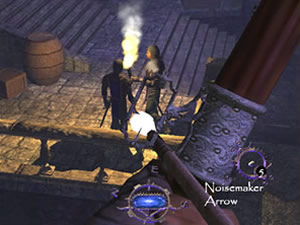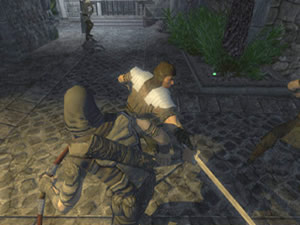Silent but deadly.
Once upon a time back in 1998, a now-defunct developer called Looking Glass spit out one of GR’s favorite games in Thief:
The Dark Project. In a world overflowing with fragfests, it stole our hearts and took first-person gaming to interesting new places with its fantastic, revolutionary stealth gameplay. Since then, though, stealth gaming has become all the rage, so we were all anxious to see how the latest version of Thief would hold up.
Developed by ex-Looking Glass maverick Warren Spector and his gang at Ion
Storm Austin (Deus Ex, anyone?), this iteration of the series bears much of
Spector’s style (open-ended levels, autonomous city areas) as well as all the
elements that made the Thief franchise popular in the first place. Unfortunately,
what’s new isn’t necessarily good, and what’s good isn’t necessarily new.
Thief: Deadly Shadows continues the story of Garret the Thief. One night, as he is stealing from the rich and wicked, Garrett is met by a cloaked man and informed that the Keepers, a shadowy Illuminati of Glyph-reading sages, need his help. Though the Keepers are reluctant to provide any concrete details, it clearly involves the fate of the world. So off you go to gather fancy bits of treasure and information from perilous locales.
From here the story mostly unfolds during the briefing scenes between missions and is narrated by Garrett. However, much of the plot also unfolds in-game through overheard conversations between NPCs as well as through notes and journals Garrett comes across in his adventures, not to mention copious cut-scenes full of portent and mystery. It’s all very well done.
The game starts with you breaking into an Inn to steal treasure from a noble, a mission that serves as a tutorial. You’ll learn to walk while crouched, shimmy along walls, climb over obstacles, shoot arrows, blackjack unwitting victims, steal treasure from unaware royalty and flashbang enemies who have detected you, most of which can be done from a toggleable first- or third-person viewpoint. Towards the end of the tutorial, you’ll find Lord Julian conspiring with a cook about covert ways into his hated cousin’s estate. A plot is hatched between them, but you overhear the details and beat them to the punch in the next mission. This is a great example of how well the plot and the objective system work together; every objective in the game has a plot-based cause and effect.
Deadly Shadows takes place in a City that is split into several districts, each of which contain a ‘fence’ who will buy your goods, a merchant who will sell you thieving supplies, lots of citizens who pay little attention to your comings and goings, and the well-named City Watch. In each district there are a few buildings and homes to break into and rob, some of which lead to little side-quests.
Though the City is fairly large, it’s divided up into a bunch of small sections,
and every time you cross from one district into another you’re treated to
a solid loading time. Furthermore, every zone is patrolled by a large City
Watch force that makes it nigh impossible to easily run from one place to
another and must either be circumnavigated or dealt with. Unfortunately, your
means of circumnavigation are extremely limited. No taking to the rooftops
or dawning disguises – you’re mostly stuck on the ground and in the shadows.
If there were more ways to explore, the City might have been a really cool
feature, but instead of San Francisco, it’s Fresno.
 Another problem with the City is the increased risk of having the bodies of your victims discovered. Dead bodies make people upset, and when the citizens get upset, they get guards, and sometimes guards get more guards. As a result, a simple backstabbing can turn into a real mess, which I suppose is realistic, but can quickly make certain avenues impassible for lengthy periods of time. If you make a mess right at a zone’s exit, and then leave, everything will be saved so that when you re-enter the zone, you’ll walk right back into the mess you created when you left. Nothing will have changed. Lame.
Another problem with the City is the increased risk of having the bodies of your victims discovered. Dead bodies make people upset, and when the citizens get upset, they get guards, and sometimes guards get more guards. As a result, a simple backstabbing can turn into a real mess, which I suppose is realistic, but can quickly make certain avenues impassible for lengthy periods of time. If you make a mess right at a zone’s exit, and then leave, everything will be saved so that when you re-enter the zone, you’ll walk right back into the mess you created when you left. Nothing will have changed. Lame.
The controls in Deadly Shadows are similar to those of the previous games in that you spend a lot of time creeping around in shadows, slapping enemies with your blackjack, and putting out torches with water arrows. This Thief is as much a stealth game as ever, although it brings little new to the table in terms of stealth gameplay. For one thing, Garrett is far less agile than a ‘newer’ sneak like Sam Fisher, which is a shame. It would have been great if he learned some new tricks, perhaps been given a speed upgrade, at least.
Because as in the previous games, Garrett is a horrible fighter. He only has one worthwhile melee weapon (a dagger), and only one attack (stab). Still, you can manage to kick a little ass by stabbing enemies in the front and then circle-strafing around to their backs, stabbing all the way. With enough practice you can actually be quite effective using this technique, but that more a fault of the game’s programming than an intentional design idea.
For the most part, though, you’ll either be sneaking past enemies, whacking them from behind or shooting them from afar. Garrett has water arrows, fire arrows, moss arrows (for coating noisy floor surfaces in a mossy carpet), gas arrows (silent kills with the bow and arrow), flashbangs, gas bombs, oil slicks, and proximity mines for the big baddies. It’s all pretty cool, but a little more variety would have been nice.
Thief‘s levels, however, are open-ended and well-crafted. You generally begin at the entrance to an area, and then must travel throughout, by no fixed path, meeting objectives, and then ultimately leaving. As mentioned before, you may pass guards by trickery and distraction or take them out with varying degrees of violence, which is where Spector’s Deus
Ex style really comes out. While it’s obviously more fun to be naughty, you can succeed all the same by simply being unseen.
 I should note again, though, that the load times are rough. Better optimization would have helped, a fact made painfully clear by a recently found bug that screws up the various difficulty levels. If you save your game and reload, it will automatically default back to Normal difficulty, making it just about impossible to play on Expert or Easy. Whoops!
I should note again, though, that the load times are rough. Better optimization would have helped, a fact made painfully clear by a recently found bug that screws up the various difficulty levels. If you save your game and reload, it will automatically default back to Normal difficulty, making it just about impossible to play on Expert or Easy. Whoops!
Thief alternates between looking awesome and awful. The dramatic lighting is used well and some environments are exceptionally spooky as a result. Garret looks great and the textures are good. The animations, on the other hand, can stink, particularly the overly floaty jump. The framerate tends to stutter a bit as well. What kills me the most is the atrocious use of rag doll physics. While it’s nice that you can lift people up and then drop them off balconies and into pits, I once smacked a guard on the back of the head and watched him bend over backward as he died in a weird parody of the infamous spider-walk from The Exorcist. Very scary, but not a very effective use of rag doll.
What Thief lacks visually is compensated by the incredible music, voice-acting and sound effects. The music is at times a wonderful mélange of dark noise, at others a menacing single-note held for intensity. Thief is full of spoken dialogue, from the threats of evil guards – “I cuts what I finds!” – to excellent conversations between NPCs.
The things Thief: Deadly Shadows does right, it does very well, and some very good stealth gameplay can be found here. However, you can’t help but notice the flaws. The City could have been much larger with more to explore, Garrett could have used a lot of new moves, and the optimization issues will almost certainly drive you a little nuts. Even though Deadly
Shadows is a fun game, a myriad of smaller problems keep it from truly stealing the show.










